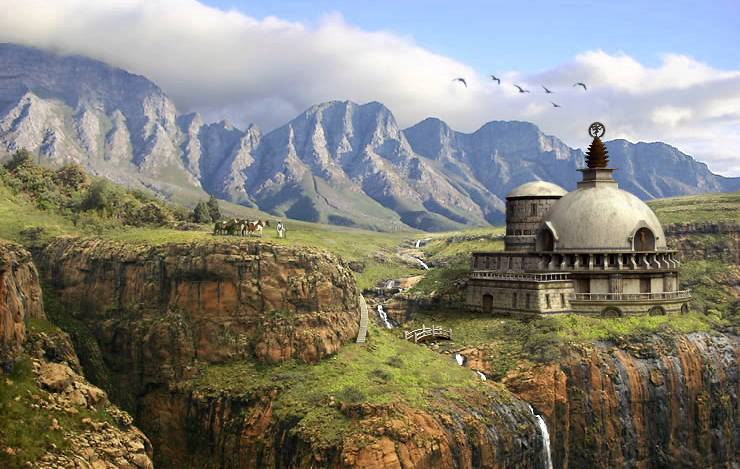I was hoping to escape politics until after New Year’s Day, but given that America may well go over the fiscal cliff tomorrow, I figured it was time for another cliff post. In the past, I’ve compared the political fight underway to Holmes and Moriarty fighting on the brink of the Reichenbach Falls and to Milkman and Guitar squaring off at Ryna’s Gulch in Toni Morrison’s Song of Solomon. Today I imagine us entering that “deep romantic chasm” that Coleridge describes in “Kubla Khan.” Of course, our chasm is considerably less romantic.
To remind us how serious the situation is, here’s Matthew O’Brien talking about what we can expect in taxes if we don’t resolve the situation:
Until or unless Congress actually does something, 2013 will be the year of tax increases. Big tax increases.
The fiscal cliff is a bit of a misnomer, but when it comes to taxes, the metaphor is apt. If all of the tax cuts, credits, and deductions set to expire at year end do in fact expire, incomes will fall off a tax cliff. Median earners will have 4 percent less in take-home pay in 2013 than they otherwise would; households making a million dollars or more would have 11.4 percent less.
And that’s just taxes. The deep cuts to defense and entitlement spending mandated by the sequestration agreement—an agreement deliberately made painful so that Congress would be forced to do something—is still on the table and will automatically go into effect. Congress agreed to the sequester to placate radical House Republicans who were refusing to raise the debt ceiling to pay for spending that Congress itself had authorized. To make matters even worse, the Republicans are again threatening not to raise the debt ceiling.
In short, over the next few months the country could be hit with multiple tax increases plus sequester cuts plus another debt ceiling stand-off plus the cutting of extended unemployment benefits. Congress will thereby plunge us into another recession or even depression. This GOP-engineered crash would stop our recovery in its tracks and push unemployment back up into double digits.
So while we won’t fall into a chasm on Monday, we will (to apply Coleridge’s imagery) make steady progress down a “green hill” and into “a savage place.”
Coleridge’s mysterious poem is often read as an account of writer’s block–a failure of poetic inspiration–but I apply it here as an account of what happens when a nation’s dark energies sabotage sunny plans.
In the poem, Kubla Khan has dreams of building a sunny pleasure dome. He has already walled in “miles and miles of fertile ground” so he is confident he will succeed here. The landscape is Edenic, containing “gardens bright with sinuous rills where blossomed many an incense bearing tree” and “forests ancient at the hills enfolding sunny spots of greenery.”
Imagine Xanadu as America and the sunny dome as Obama’s 2008 optimistic vision of bipartisan collaboration in a post-racial environment.
The problem with Kubla Khan’s building project, however, is the dark chasm. Likewise, Obama didn’t realize how his invocation of hope would trigger an implacable hatred. It burst forth as a mighty river in the Tea Party summer of 2010:
And from this chasm, with ceaseless turmoil seething,
As if this earth in fast thick pants were breathing,
A mighty fountain momently was forced:
Amid whose swift half-intermitted burst
Huge fragments vaulted like rebounding hail,
Or chaffy grain beneath the thresher’s flail . . .
The river winds crazily through the landscape–“five miles meandering in a mazy motion”—which isn’t a bad description of Tea Party activism.
But though the river is initially impressive, ultimately it is sterile, returning to the chasm that produced it and falling in tumult to “a lifeless ocean.” Anti-Obama rage may sabotage his sunny plans but the rage offers nothing positive in exchange:
And ’mid this tumult Kubla heard from far
Ancestral voices prophesying war!
Lest it appear that I’m straining to0 hard to apply the poem to contemporary politics, note that America’s most famous film, made at a dark time, turned to this poem to capture a sense of national impotence. I’m thinking of Citizen Kane, in which we see a newsreel account of Kane’s life that compares him to Kubla Khan and cites the opening line of the poem. Kane’s life begins with tremendous potential but ends with opportunity squandered.
Like Orson Welles, we can use Coleridge’s poem to see the parameters of our own situation. America has beautiful dreams and America has a savage streak, and we must take both into account. Those idealists who focus only on the sunny dome will be blindsided by the chasm.
So can Kubla Khan acknowledge both the sunny and the savage in his construction process? He imagines a dark “damsel with a dulcimer” inspiring him, and for our purposes let’s say that she is Lady Liberty, the statue that holds her torch high in the New York harbor.
A damsel with a dulcimer
In a vision once I saw:
It was an Abyssinian maid
And on her dulcimer she played,
Singing of Mount Abora.
Could I revive within me
Her symphony and song,
To such a deep delight ’twould win me,
That with music loud and long,
I would build that dome in air,
That sunny dome! those caves of ice!
Notice that the poet now sees the caves of ice as inseparable from the sunny dome. Our country will always have both, fertile gardens and seething chasms, utopian hope and tribal anger. The challenge that is always before us is to build a country that takes both into account. Maybe our new year’s resolution can be to listen closely to Lady’s Liberty and find the resolve, despite the odds, to revive within us her symphony and song.
Oracular poets—those with flashing eyes and floating hair—can help us see the way. But the hard work is up to us.


